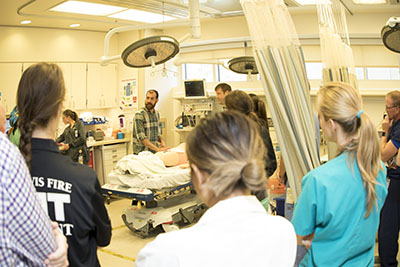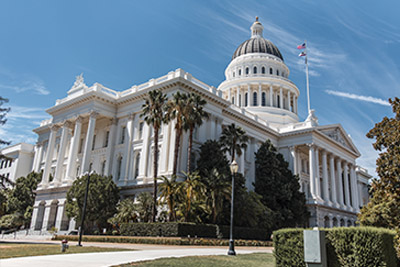Career Development Experiences
The UC Davis General Surgery Residency goal is to train surgical leaders. We have designed our educational program to focus on operative management of surgical disease as well as perioperative and surgical critical care. Our graduates finish the program with the skills, clinical maturity, and confidence to tackle the most complex surgical problems and offer the best care.
Within the framework of our strong clinical education program, we recognize that one model of training does not fit everyone. In order to help our graduates achieve their greatest potential, we encourage residents to choose one of the Career Educational Experiences to help guide their training.
 Mock Trauma Code
Mock Trauma Code
UC Davis is proud to be an ACS Accredited Education Institute with an ACS-accredited Surgical Education and Simulation Fellowship program. The surgical education track includes training in medical and surgical education, curriculum development, assessment, simulation, and procedural training. Fellows conduct research in education and are supported to submit work to annual conferences including the ACS Simulation Summit and Surgical Education Week. The program also offers opportunities to work with program and GME leadership on residency initiatives and to teach faculty, residents, medical students, and other health professionals through the UC Davis School of Medicine and the state-of-the-art Center for Simulation and Education Enhancement.
 The Surgeon Scientist track is designed to provide residents with intensive basic or translational research training in preparation for a career in academic surgery. Training in this track emphasizes the scientific process, experimental design, laboratory techniques, animal studies, statistical modeling and data analysis. Prior and current residents have focused on training in diverse surgical specialties (Pediatric/Fetal Surgery, Surgical Oncology, Transplant Surgery, Trauma and Acute Care Surgery, and Vascular Surgery), and routinely participate in faculty-sponsored journal clubs within their chosen field of study.
The Surgeon Scientist track is designed to provide residents with intensive basic or translational research training in preparation for a career in academic surgery. Training in this track emphasizes the scientific process, experimental design, laboratory techniques, animal studies, statistical modeling and data analysis. Prior and current residents have focused on training in diverse surgical specialties (Pediatric/Fetal Surgery, Surgical Oncology, Transplant Surgery, Trauma and Acute Care Surgery, and Vascular Surgery), and routinely participate in faculty-sponsored journal clubs within their chosen field of study.
This track utilizes resources provided at the UC Davis Medical Center in Sacramento in addition to the main UC Davis campus (18 miles west of Sacramento). Resources available in Sacramento include several laboratories within UC Davis Medical Center, the Institute for Regenerative Cures (IRC), Clinical and Translational Science Center (CTSC), the Surgical Bioengineering Laboratory, and Shriners Hospital for Children. Main campus resources include collaborations with the UC Davis Veterinary School and the Genome and Biomedical Science Facility (GBSF). The Clinical Investigation Facility (CIF) at Travis Air Force Base supports ongoing large animal studies in collaboration with the United States Air Force.
In addition to formal and informal training opportunities in basic and translational research, there are opportunities to earn advanced degrees through UC Davis graduate programs and the School of Medicine (MS, PhD). One such degree is the Masters in Advanced Studies (MAS) via the Mentored Clinical Research Training Program, a two-year degree which provides training in research methodology, study design, statistical analysis, and grant writing. This masters can be earned while performing basic, translational, or clinical research, and is free of charge to UC Davis residents. The California Institute for Regenerative Medicine provides an additional funded scholarship for stem-cell related research via the Cellular Therapy Training Program. Past residents have also obtained degrees in related areas to include Masters in Public Health and Masters in Genomics/Bioinformatics.
Recognizing that medicine is now global and that many challenges facing those who practice in an international environment are similar to those faced in rural America, we developed a distinct global/rural surgery track. This track offers two separate routes, the rural surgery route gives a resident the necessary skills go directly into practice in a rural community with limited resources.
The global path paves the way for residents to be leaders in global surgery. With the leadership of Dr. Diana L. Farmer, we have developed a robust international experience. A one- or two-year rotation has been established in East London, South Africa. This experience is a combination of clinical exposure, operative cases, and collaborative research focusing on common diseases in the region. There is an opportunity to obtain an MPH from University of Capetown. We are currently developing experiences at other sites, specifically in the Philippines. Read more about the global and rural surgery track and the residents who are participating in the track.
 Surgical leadership is essential in the current medical climate. The challenge is that the current climate diverges from traditional surgical expertise and focuses on public policy and development of efficient care delivery systems. To meet this challenge we have utilized our local resources with the State Capitol, UC Davis School of Business, and Institute of Comparative Effectiveness to develop a Public Policy/Comparative Effectiveness track. This track combines work experience and mentoring in public policy with research focused on development of effective and efficient delivery of surgical care. The final years of clinical training within this track can be focused in the resident’s chosen specialty (MIS, Surgical Oncology, Acute Care Surgery, Vascular).
Surgical leadership is essential in the current medical climate. The challenge is that the current climate diverges from traditional surgical expertise and focuses on public policy and development of efficient care delivery systems. To meet this challenge we have utilized our local resources with the State Capitol, UC Davis School of Business, and Institute of Comparative Effectiveness to develop a Public Policy/Comparative Effectiveness track. This track combines work experience and mentoring in public policy with research focused on development of effective and efficient delivery of surgical care. The final years of clinical training within this track can be focused in the resident’s chosen specialty (MIS, Surgical Oncology, Acute Care Surgery, Vascular).
The Quality, Safety, and Comparative Effectiveness Research Training (QSCERT) T32 Program is a multidisciplinary, postdoctoral training program in quality, safety and comparative effectiveness research with an emphasis on training future leaders in surgical, trauma, and urgent/emergency care outcomes research.
Residents will participate in a one- or two-year training course and will be selected based on a competitive application process. Each track is founded on prior experience and training (e.g., MD vs. PhD) and individual learning needs.
- Track 1: MPH program (2 years)
- Track 2: Master of Advanced Study in Clinical Research (2 years)
- Track 3: QSCERT Certificate Program (1-2 years)
These experiences entail focused educational, research and leadership efforts in each of the specified areas. This training is incorporated into our broader general surgery curriculum.

